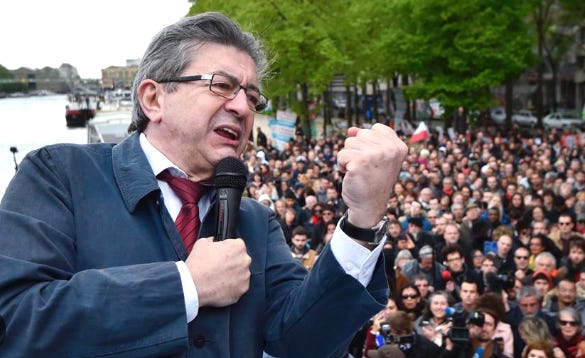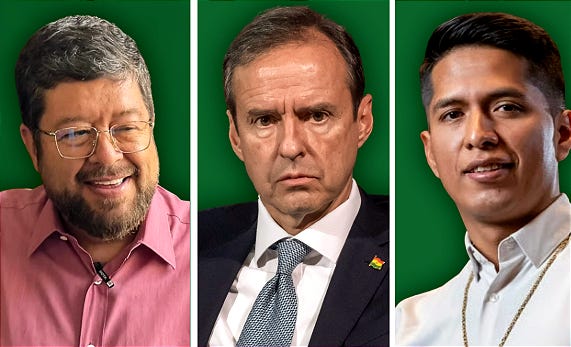Mélenchon Backs the Planned September 10 '#BloquonsTout' Protest, China-Canada Trade War Continues, Alaska Summit Concludes Without a Deal, India-China to Resume Cross-border Trade, and More
Grinfi Political Risk Intelligence Briefing
Welcome to this week’s edition of Grinfi Political Risk Edge, your trusted source for expert political risk analysis and strategic intelligence. Thorough, insightful, and industry-focused. In this issue, we examine key geopolitical events shaping global markets and provide deep, beyond-the-headlines assessment. We deliver clarity in uncertainty and strength in decision-making. Anticipate, Adapt, and Excel!
But first, our Market Risk and Political Risk Reports (Geostrategic Pressure Points) for the month of July have been published. Read them here.
Now, let’s begin the week with a laugh 😄 to brighten the mood.
Help us serve you better and improve Grinfi Political Risk Edge by taking this brief, fully anonymized reader survey.
"Patriots always talk of dying for their country, and never of killing for their country."
Bertrand Russell, ‘Has Man a Future?’ London: George Allen & Unwin, 1961.
Disclaimer: The opinion expressed in this quote does not represent our views but is intended for reflection purposes only.
From Grinfi Political Risk Observatory (GPRO), here’s what we’re monitoring:
High Impact Situational Updates
MAJOR HEADLINES
— Global Credit Risk Premia Fall to Two-Decade Lows as Capital Flows Into Emerging Markets
On August 14, credit spreads for U.S. investment grade bonds fell to 0.8%, close to a twenty-year low, supported by steady demand and limited net new issuance, according to multiple official market reports. U.S. high yield option adjusted spreads remain below 3%, while the spread between emerging market hard currency debt and U.S. Treasuries dipped under 200 basis points for the first time since 2007. This compression has catalyzed heavy issuance by sovereigns and corporates outside China, alongside brisk international bond sales from emerging markets.
Investor flows is also reflecting this bullish trend. European and U.S. allocations to emerging market assets have risen sharply, with equity ETFs receiving €8.1 billion and bond ETFs €1.1 billion, the strongest six-year run.
A recent Bank of America survey found 37% of global investors overweight emerging market equities, the highest since early 2023, while nearly half view them as undervalued compared with 91% who see U.S. equities as overvalued.
Strategic Takeaway
Tight spreads and strong reallocation into emerging markets reflect investors’ search for yield and valuation. The backdrop favors debt financing but remains fragile. Any hawkish policy surprise or geopolitical shock could re-widen spreads quickly, with lower-rated emerging market issuers most exposed.
Action Roadmap for Corporate Stakeholders
Finance and Treasury: Lock in long term borrowing while spreads remain compressed and liquidity is abundant.
Portfolio and Risk Teams: Evaluate emerging market opportunities but incorporate FX volatility, political risk, and the likelihood of rapid flow reversals.
Boards: Maintain liquidity buffers and contingency plans for sudden dislocations in spreads or capital flows.
— Bolivia Heads to October 19 Runoff as Conservatives Lead
On August 17, Bolivia held presidential and legislative elections against a backdrop of inflation above 20%, chronic fuel shortages, and a fractured political field.
Early projections put Samuel Doria Medina and Jorge Quiroga in the lead, while the ruling MAS party registered below 10% support. Former president Evo Morales, currently in hiding and barred from running, called for a boycott, but turnout remained steady.
International press reported isolated incidents, including an attack on candidate Andrónico Rodríguez at a polling site, though voting proceeded broadly without disruption. Official Preliminary results now confirm conservative candidates Rodrigo Paz and Jorge “Tuto” Quiroga leading, with no contender likely to secure 40% of the vote and a 10 point margin. A runoff is therefore scheduled for October 19.
Strategic Takeaway
The election signals a potential end to two decades of socialist dominance and the emergence of a new centrist and right-leaning alignment. If confirmed, a policy reset would likely focus on stabilization and external financing, with the possibility of opening parts of the lithium sector to foreign investment, though social pushback is a significant risk. Whoever prevails faces urgent tasks: rebuild reserves, repair fuel and FX distortions, and restore investor confidence, particularly in hydrocarbons and lithium.
Action Roadmap for Corporate Stakeholders
Country risk: Stress test revenue and offtake assumptions under subsidy reform and FX unification scenarios.
Sector focus: Adopt a wait-and-see approach. Delay major commitments until results clarify policy direction. Reassess timelines and counterparty risk in hydrocarbons and lithium, and incorporate stabilization clauses as you prepare for potential policy changes in mining and gas. Hedge against currency and inflation volatility.
Monitoring: Track post-election cabinet formation and central bank appointments for signals on economic policy and external financing strategy.
— Mélenchon Backs the Planned September 10 “#BloquonsTout” Nationwide Protest
On August 17, Jean Luc Mélenchon and senior La France insoumise (LFI) figures, including Mathilde Panot and Manuel Bompard, publicly endorsed a September 10 call to “Bloquons Tout” (“block everything”) while demanding an immediate motion of censure (vote of no confidence) against Prime Minister François Bayrou.





